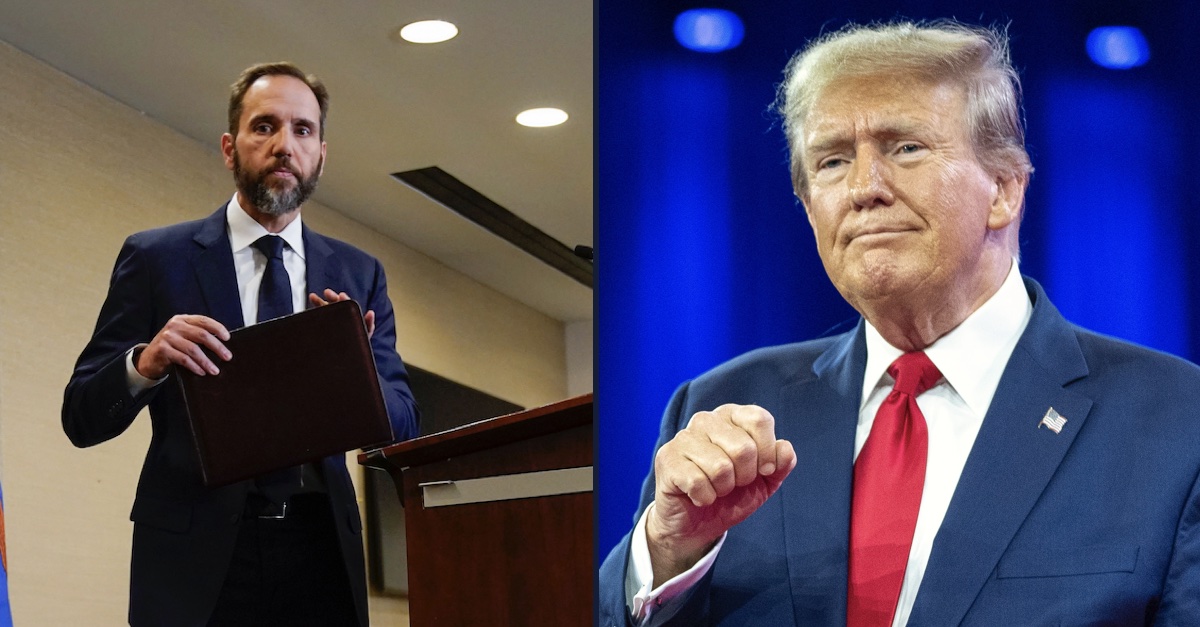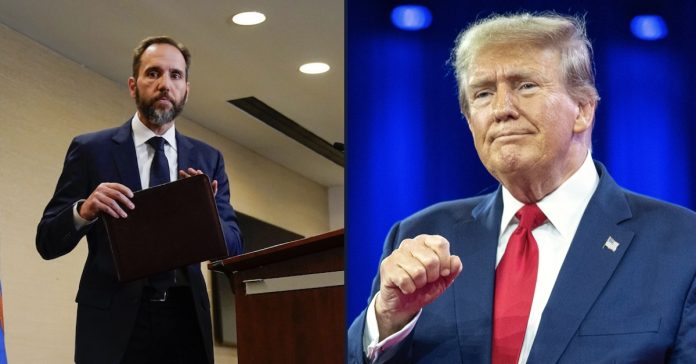
Jack Smith (AP Photo/Jacquelyn Martin), Donald Trump (AP Photo/Alex Brandon, File)
The man appointed to prosecute the government’s case against Donald Trump over his alleged wrongful retention of classified documents responded to “meritless” arguments from former U.S. Attorney General Edward Meese III, a Federalist Society co-founder, and Citizens United asserting that he lacks legal authority to prosecute the former president.
The filing from special counsel Jack Smith came on Friday, one day after U.S. District Court Judge Aileen Cannon refused Trump’s attempt to dismiss the first 32 counts in his superseding indictment as being “constitutionally vague” under the Espionage Act. Cannon has not yet ruled on Trump’s motion to dismiss based on his claim that while in office, the Presidential Records Act gave him the authority to simply declare classified documents as personal documents.
Meese, who in 1985 was appointed as the 75th U.S. Attorney General by President Ronald Reagan and Citizens United, the group best known for gutting federal campaign finance law via the U.S. Supreme Court’s landmark 2010 decision, were joined in the amicus brief by Boston University School of Law Professor Gary Lawson and Northwestern Pritzker School of Law Professor Steven Calabresi — who cofounded one of the three original chapters of the Federalist Society.
The “Meese Amicus,” as Smith refers to it in his filing, largely focused on issues already raised by Trump’s legal team — that the U.S. Attorney General does not have the statutory authority to appoint a special counsel.
“Smith does not have authority to prosecute this case,” the amici argued. “Those actions can be taken only by persons properly appointed as federal officers to properly created federal offices. But neither Smith nor the position of Special Counsel under which he purportedly acts meets those criteria. He wields tremendous power, answerable to no one. And that is a serious problem for the rule of law — whatever one may think of former President Donald Trump or the conduct Smith challenges in the underlying case.”
However, Meese also argued that his objections under the Appointments Clause are “structural” and “constitutional” issues of the highest caliber “that should be treated as a priority over standard defenses.” The brief argued that Cannon is required to settle this “quasi-jurisdictional issue” before even considering the laundry list of other pretrial motions before the court in the protracted case.
Smith vehemently rejected Meese’s claims, outright stating, “those additional arguments are meritless.”
Regarding whether Cannon is required to take up the challenge to the special counsel’s authority first, Smith argues that there is no precedent for “leapfrogging” that motion ahead of the others.
“Neither Trump’s challenge nor the Meese Amicus’s additional theories are novel or meritorious; to the contrary, every court that has considered them has rejected them — including authoritative decisions by the Supreme Court,” Smith wrote in the reply. “And resolving the validity of the Special Counsel’s appointment would not lead to an accelerated appellate proceeding if Trump’s claim failed. Unlike with a non-frivolous immunity claim, Trump would have no right to an interlocutory appeal should the Court deny his Appointments Clause challenge.”
Smith also argues that Meese’s assertion that he is a principal officer under the Constitution that requires presidential appointment and Senate confirmation “fails” as he is overseen and reports to officers of higher authority.
“Under governing authority, the Special Counsel is an “inferior Officer” who may be appointed by the head of a department because he is subject to supervision and oversight by the Attorney General,” Smith writes. “That conclusion is confirmed by cases addressing prosecutors vested with authority comparable to the Special Counsel.”
Smith’s response also emphasized that the Attorney General, who is appointed by the president and confirmed by the Senate, maintains the authority to remove him from the role of special prosecutor.
Have a tip we should know? [email protected]

